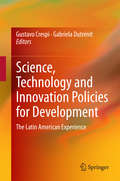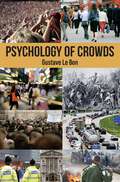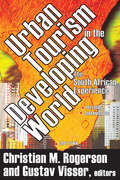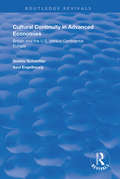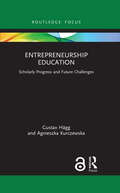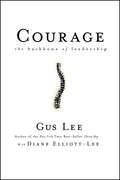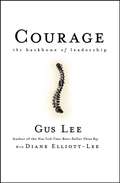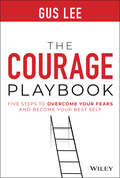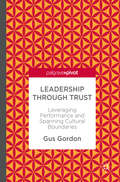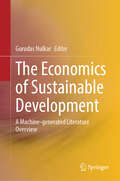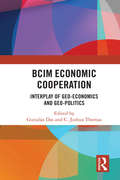- Table View
- List View
Science, Technology and Innovation Policies for Development
by Gustavo Crespi Gabriela DutrénitThis book examines the implementation of science, technology and innovation (STI) policy in eight Latin American countries and the different paths these policies have taken. It provides empirical evidence to examine the extent to which STI policies are contributing to the development of the region, as well as to the solution of market failures and the stimulus of the region's innovation systems. Since the pioneering work of Solow (1957), it has been recognized that innovation is critical for economic growth both in developed and in less-developed countries. Unfortunately Latin America lags behind world trends, and although over the last 20 years the region has established a more stable and certain macroeconomic regime, it is also clear that these changes have not been enough to trigger a process of innovation and productivity to catch-up. Against this rather grim scenario there is some optimism emerging throughout the region. After many years of inaction the region has begun to invest in science, technology and engineering once again. Furthermore, after many changes in innovation policy frameworks, there is now an emerging consensus on the need for a solution to coordination failures that hinder the interaction between supply and demand. Offering an informative and analytic insight into STI policymaking within Latin America, this book can be used by students, researchers and practitioners who are interested in the design and implementation of innovation policies. This book also intends to encourage discussion and collaboration amongst current policy makers within the region.
Las parejas inteligentes enriquecen juntas
by Gustavo Cerbasi¿Cuándo fuela última vez que usted y su cónyuge hablaron de sus finanzas?Hoy en día demasiados cónyuges no se sientan juntos para evaluar susfinanzas. Muchasveces a las esposas se les ha delegado el complejo deber de balancear,manejary pagar las cuentas. La falta de comunicación en las finanzas tambiénse refleja en la comunicación del matrimonio. Muchas veces las familiasque por fuera parecentenerlo todo bajo control, por dentro están completamente enbancarrota. Gustavo Cerbasiayuda a guiar a las parejas, combinando tanto la teoría como losejercicios prácticos, mientras comunican, planifican y funcionanfinancieramente como una unidad familiar.
Original Sin and Procylical Fiscal Policy: Two Sides of the Same Coin?
by Gustavo AdlerA report from the International Monetary Fund.
Club Atletico Boca Juniors
by Anita Elberse Gustavo A. Herrero Alberto BallveClub Atletico Boca Juniors is the most popular soccer club in Argentina and one of the most decorated clubs in the world. Throughout its storied history, the club has recruited and developed dozens of star players. In his eleven years at Boca Juniors, president Mauricio Macri has significantly increased the club's net worth and annual revenues. However, he faces a constant challenge to remain competitive on and off the field. In November 2006, Macri is approached by Spanish and Italian soccer powerhouses, seeking to purchase the players Fernando Gago and Rodrigo Palacio. Should Macri enter negotiations with the clubs interested in buying the star players? If so, how should they approach the talks? Allows for an in-depth examination of Boca Junior's business model, and how it differs from that of the richer soccer clubs in Western Europe. Also enables an assessment of successful talent and brand management strategies in the context of a sports franchise with a worldwide reach.
Psychology of Crowds
by Gustave Le BonIn this clear and vivid book, Gustave Le Bon throws light on the unconscious irrational workings of group thought and mass emotion as he places crowd ideology in opposition to free-thinking and independent minded individuals. He also shows how the behaviour of an individual changes when she/he is part of a crowd.Le Bon was an eminent psychologist and sociologist. The ideas le Bon explores in this book are extremely relevant to today's society and were of pivotal importance in the early years of group psychology: Sigmund Freud's Massenpsychologie und Ich-Analyse (1921); (English translation Group Psychology and the Analysis of the Ego, 1922) was based on Le Bon's work. Applications include financial market behaviour and political delusions.The original of this work, La Psychologie des Foules, was first translated anonymously into English possibly by a group of French students. Sparkling Books has corrected errors and anomalies in the original translation by reference to the Alcan edition. We have shortened a few passages but maintained the original footnotes and have added some footnotes of our own. Contents>Book One - The Mind of Crowds General characteristics of crowds and the psychological law of their mental unity The sentiments and morality of crowds The ideas, reasoning power, and imagination of crowds The religious nature of crowd convictions Book Two - The Opinions and Beliefs of Crowds Indirect factors of the opinions and beliefs of crowds Direct factors of the opinions of crowds The leaders of crowds and their means of persuasion Fixed beliefs and changeable opinions of crowds Book Three - The Classification and Description of the Different Kinds of Crowds The classification of crowds Crowds committing crimes Criminal juries Electoral assemblies
Urban Tourism in the Developing World: The South African Experience
by Gustav VisserOver the past decade, the field of urban tourism has consolidated with the appearance of several books that concentrate upon the Western European and North American experience. Recently, the scope and range of urban research has widened considerably, including the welcome appearance of studies that examine the tourism phenomenon in cities outside the Euro-American heartland.Despite this growing international body of debate and scholarship on tourism and cities, particularly in the developed North, literature that relates to the developing world as a whole, and to Africa in particular, remains sparse. The task of Urban Tourism in the Developing World: The South African Experience is to augment the current international scholarship concerning urban tourism in the developing world. More especially, the contributors draw attention to a range of case studies from South Africa that provide some starting points to address the uneven scholarly coverage of urban tourism the African context has received to date. In addition, the research material presented here seeks to contribute toward raising the South African, and indeed the African profile, within growing international scholarship concerning issues of urban tourism and development.This collection aims to expand an emerging South African and African tourism research "voice" concerning the tourism and development nexus, as well as to stem critiques that this body of research appears to have developed in a theoretical vacuum, divorced from broader international tourism research discourses. This collection of essays not only further develops an independent South African tourism perspective, but also presents research that is closely tied to international urban tourism research debates. In addition, this analysis of urban tourism in the South African context enriches the rather Western-oriented theories of urban tourism discourse through its emphasis on how urban tourism is evolving in urban Africa.
German Economy, 1870-1940: Issues and Trends (Routledge Library Editions: The German Economy #12)
by Gustav StolperOriginally published in 1940, this book remains an illuminating and forceful survey of the economic development of modern Germany. It reveals for the first time the basic trends of German business enterprise towards central control. This survey makes three important factors clear. Firstly, the continuity in the underlying trends of German history; secondly the characteristic prevalence of 'statism' in German history; thirdly, Nazism cannot be explained on purely economic grounds: no other county showed such a striking sequel of ups and downs as that which this book illustrates in the economic history of the late 19th and early 20th centuries.
Cultural Continuity in Advanced Economies: Britain and the U.S. Versus Continental Europe (Routledge Revivals)
by Gustav SchachterOriginally published in 2005. In the past three centuries Britain, Continental Europe and the United States have all experienced remarkable continuity in terms of the character and nature of the relations between the State and the economy. In a fascinating and eminently readable account, this book examines the significance of ideology in the formation of economic policy in the two groups of countries, comparing and contrasting the minimalist state-ownership societies of Britain and the United States with the interventionist states of Continental Europe. The book uncovers a continued contrast between the economic and social individualism of Britain and the United States, and the reliance on the State typical of nations in Continental Europe. The readership will benefit from a clearer understanding of the varying degrees of intervention in both the domestic and international economic policies employed, and the illuminating comparisons between the Continentals and the more market orientated nations of Britain and the United States.
Globalization and Self-Determination: Is the Nation-State Under Siege? (Routledge Studies in the Modern World Economy #Vol. 58)
by Gustav Ranis David R. Cameron Annalisa ZinnIs the nation state under siege? A common answer is that globalization poses two fundamental threats to state sovereignty. The first concerns the unleashing of centrifugal and centripetal forces - such as increasing market integration and the activities of institutions like the IMF, World Bank, and WTO - that imperil state sovereignty from 'outside' the nation state. The second threat emanates from self-determination movements that jeopardize state sovereignty from 'inside'. Rigorously analyzing popular hypotheses on globalization's effect on state sovereignty from a broad social sciences perspective, the authors use empirical evidence to suggest that globalization's multilevel threats to state sovereignty have been overestimated. In most instances globalization is likely to generate pressure for increased government spending while only one form of market integration - foreign direct investment by multinational enterprises - appears to increase any feeling of economic insecurity. This volume will be invaluable to course instructors at both graduate and undergraduate levels, policy makers and members of the general public who are concerned about the effects of globalization on the nation-state.
Entrepreneurship Education: Scholarly Progress and Future Challenges (Routledge Focus on Business and Management)
by Gustav Hägg Agnieszka KurczewskaThe discussion around whether entrepreneurship can be taught is becoming obsolete as the number of entrepreneurship courses, specializations and degrees is rising at an unprecedented rate all over the world and the demand for entrepreneurial education teachers or instructors is constantly growing. The global community of entrepreneurial education proponents is enthusiastic about the possibility of spreading the idea of entrepreneurship, as it is believed to benefit societies and economies in addition to influencing human development on an individual level. The fervour is nurtured by public policies and the development of an enterprising culture in the public discourse. In this discourse, entrepreneurship is treated as a panacea for numerous social and economic problems. This book is a solid reference point for all who are interested in conducting research on entrepreneurial education or engaged in teaching entrepreneurship. It is a compendium of knowledge about entrepreneurial education as a research field, seen from the perspective of the last four decades, its complete contemporary history. It reviews the progress of the field from the outset to the present in terms of its socio-economic context, changes in the academic community, but also its research focus and methodological development. This uniquely comprehensive book is a resource of both knowledge on entrepreneurial education research and inspiration for future studies within the field. This timely and relevant book provides practical insights for educators when developing their teaching practice and will be of interest to entrepreneurship educators and entrepreneurship education researchers.
Organizational Burnout: Das versteckte Phänomen ausgebrannter Organisationen
by Gustav GreveErfahren Sie in diesem Buch alles rund um das Thema Managementfehler und Organizational BurnoutBleiben bei einer gut aufgestellten Unternehmensorganisation die bisherigen Erfolge aus, dann ist oft ein sogenannter Organizational Burnout (OBO) die Ursache dafür. Gustav Greve beschreibt das weit verbreitete Phänomen in diesem Buch eindrücklich und anschaulich. Seit 2010 sind 143.4751 Unternehmen in die Insolvenz gegangen - davon mindestens die Hälfte wegen Managementfehlern. Viele ausgebrannte Organisationen könnten heute noch dabei sein, wenn sie sich diesem aktuellen Phänomen souverän gestellt hätten. Aus diesem Grund schildert der Autor in seinem Buch die typischen Gründe, Symptome und Folgen des Organizational Burnout sowie eine wirksame Therapie. Er erklärt die Erfolgsdefizite der betroffenen Unternehmen und zeigt damit einen Weg aus der Krise auf. Ein sehr praxisorientiertes Fachbuch für Unternehmer, Führungskräfte und BeraterGreves Werk „Organizational Burnout“ ist ein Buch aus der Praxis für die Praxis. Es richtet sich an:EigentümerUnternehmerFührungskräfteMitarbeiter BeraterDas Werk basiert in erster Linie auf Greves Erfahrungen als Unternehmer, CEO und Unternehmensberater. Dem Autor ist es damit gelungen, ein leicht lesbares Buch über Organizational Burnout mit Tiefgang und umfassenden Begründungen zu schreiben, das nie belehrend, aber zugleich doch lehrreich ist. Greve möchte damit zeigen, wie Unternehmen den Paradigmenwechsel schaffen und neue Energie für einen organisationsmentalen Turnaround finden. Für die 4. Auflage wurde das Buch vollständig durchgesehen und aktualisiert.
The Downfall of the Gold Standard (Routledge Library Editions: The Gold Standard #2)
by Gustav CasselIn this book, originally published in 1936, the author charts the sequence of events which converted him from an advocate of the restoration of the gold standard to a convinced opponent. His indictment of the gold standard is comprehensive and he attributes it as the chief cause of the economic difficulties of the 1920s. An invaluable commentary on the monetary instability of these crucial years, this book was written not only for economists and bankers but also for those interested in following the narrative of the most tumultuous events in the history of money.
Wirtschaftliche Krisen bewältigen: Neue Erkenntnisse aus den jüngsten Krisen
by Gustav A. HornDas Fachbuch gibt einen kompakten Überblick über den aktuellen Stand der Forschung zur Bekämpfung von wirtschaftlichen Krisen. Die Gedankenwelt der Ökonomen hat sich seit der Finanzmarktkrise und der Krise des Euroraums dramatisch verändert. In kurzer Zeit und unter hohem Druck mussten neue Instrumente der Krisenbekämpfung entwickelt und alte, als überholt angesehene wieder angewandt werden. Das verstärkte sich durch die Coronapandemie und jüngst durch den Krieg in der Ukraine. Der Autor zieht eine Zwischenbilanz dieser Reform ökonomischen Denkens. Dabei werden Forschungsergebnisse zu neueren Krisen aufgearbeitet und im Hinblick auf ihre Tragfähigkeit zur Krisenerklärung diskutiert. Im Ergebnis zeigt sich, wie wichtig auch neuere Formen der Stabilisierungspolitik sind, um Panik und Unsicherheit rasch bekämpfen zu können. Es bedarf somit einer aktiven und sich immer wieder neu erfindenden gesamtwirtschaftlich orientierten Politik, um Krisen Herr zu werden.
How to Be an Architect Developer
by Amanda Baillieu Gus ZogolovitchHow many times have you spotted an empty site and dreamt about developing it? And how many times have you given up because of the difficulty of persuading the landowner to sell you the land? Many architects have built their own house, but few have made the leap to become a fully-fledged architect developer. As trained problem solvers, architects are in a strong position to release value from sites and spot opportunities. They’re able to work up creative solutions, which a non-architect developer might. Featuring illustrated case studies and practical guidance, this is the first book aimed at the architect developer that covers every stage of the development process, from finding land through to raising capital, understanding risk and marketing and selling.
Look for the Union Label: History of the International Ladies' Garment Workers' Union
by Gus TylerThis work provides a history of the International Ladies' Garment Workers' Union. Topics covered include: the union's influence on political legislation and global economy; the story of the East European immigrants at the turn of the 20th century; and the union's spirit of social reform.
Reinicia: 10 fundamentos del éxito personal y profesional
by Gus Marcos¿Un emprendedor nace o se hace? ¿Cuál es el arquetipo del emprendedor? ¿Qué significa el éxito para un emprendedor? ¿Qué habilidades son esenciales para alcanzar el éxito? ¿Se puede ir tras el sueño de un proyecto sin descuidar la salud y la familia? ¿Cómo capitalizar los aprendizajes de la vida personal para impulsar la profesional y viceversa? Emprender es una forma de vida. Construir un negocio y alcanzar el bienestar es una misión que exige lo mejor de nosotros. El camino nos pone a prueba y a la meta solo llegan aquellos dispuestos a enfrentar la incertidumbre y hacer los sacrificios necesarios para ver realizado su sueño. Gus Marcos, emprendedor serial y líder de negocios en México, responde en este libro todas estas preguntas a través de las anécdotas y los aprendizajes que ha acumulado como empresario durante más de una década. En estas páginas, escritas con la misma convicción con la que Gus afronta cada uno de sus proyectos, encontrarás lo que para él son los 10 fundamentosdel éxito tanto en la vida privada como en la laboral. Sus principios inspirarán tanto a emprendedores como a aquellos que aún no se deciden a seguir sus sueños y buscan motivación, y se basan en una idea clave: hay que reiniciar la vida con un nuevo mindset para llegar a los lugares más prósperos.
Courage
by Gus Lee Diane Elliott-LeeIn Courage, Gus Lee captures the essential component of leadership in measurable behaviors. Using actual stories from Whirlpool, Kaiser Permanente, IntegWare, WorldCom and other organizations, Lee shows how highly successful executives face and overcome their fears to develop moral intelligence. These real-world examples offer practical lessons for rooting out unethical practices and behaviors by Assessing them for rightness and integrity Addressing moral failures Following through with dialogue and direct action
Courage: The Backbone of Leadership
by Gus Lee Diane Elliott-LeeCourage: The Backbone of Leadership uses true stories from Whirlpool, Kaiser Permanente, IntegWare, and other actual organizations. This book has three parts. In Part One, we learn what happens when courage is not considered and what happens when it is. Part Two deals with "Courage in Action." Part Three, "Growing Your Courage," concludes with a set of take-away practices. The book makes us learn to use specific tools and measurements to apply the behaviors of courage in everyday situations.
The Courage Playbook: Five Steps to Overcome Your Fears and Become Your Best Self
by Gus LeeA practical pathway to a meaningful life and courageous leadership In The Courage Playbook: Five Steps to Overcome Your Fears and Become Your Best Self, Gus Lee, bestselling author and leadership expert, delivers an astonishing reveal that with moral courage, we can overcome our fears. This is a practical guide to gaining your courage to live rightly, treat others without bias and lead inspirationally. Readers will acquire Five Steps to Courage, 3 NO’s, 3 GO’s and Courageous Communication Plays. These lend deeper meaning to life, strengthen our character, improve relationships and allow us to help others for the common good. They lead to contentment, love and even happiness. The Playbook is a practical, behavior-based “Other-Help” guide that equips us more effectively than the worried “self-help” approach. The Courage Playbook includes: Skills and strategies for healthfully and authentically deploying courage in your life Ways to actually solve tough moral problems and conflicts at their root cause, genuinely help others, model strength and close the “Courage Gap” Methods for courageous and inspirational communication and leadership for all manner of situations – professionally, personally, relationally and organizationally Designed for people in all circumstances, to include young professionals, executives and leaders, The Courage Playbook belongs on the desks and libraries of business organizations, government agencies, healthcare, education, non-profits, military units, public safety organizations and on the bedside table of all people who want a seriously effective pathway to deeply improve themselves.
Leadership through Trust
by Gus GordonThis book proposes that the key ingredient to effective leadership is trust and that leaders must earn the trust of their colleagues to be successful. The author uses his experience as a CEO in Mexico, a low trust society, as the basis of his model of trust leadership, which incorporates empathy and servant leadership principles. This book bridges the gap of abstract leadership concepts to practical application and implementation of leadership principles. Scholars can learn from the first-hand experience of the author as CEO while leaders can become more effective by grasping the theoretical underpinnings of leadership that the author offers.
The Economics of Sustainable Development: A Machine-generated Literature Overview
by Gurudas NulkarThis book is a machine-generated literature overview that explores the interlinkages between communities, both rural and urban, and how they are dependent on natural resources and ecosystem services for livelihoods. With increasing urbanization and changing land use, sourcing food, fuel, and other basic needs from forests and grasslands is turning into a significant challenge, especially in the developing world where they have to balance regional aspirations against the environmental impact and legacy for forthcoming generations. As sources of sustainable livelihoods decline, it affects their ability to overcome poverty. Furthermore, economic impacts on the natural capital can undermine the long-term sustainability of communities, and negatively affect their health and well-being.To ensure economic growth and sustainable livelihoods, it is imperative to rethink how economic growth and agriculture can reduce their impacts on the natural environment. How dowe integrate economic, social, and environmental aspects into our economy? The book will discuss aspects of sustainable consumption, conservation of ecosystems and biodiversity, and making rural communities resilient to the impacts of climate change. By recognizing the economic value of ecosystem services, decision-makers can better understand the benefits and costs of different land uses and resource management practices and make more informed choices that promote sustainable livelihoods and natural capital conservation. The book will be a great resource for policy-makers, students of economics and sustainable development, non-governmental organizations working in this field, and corporate managers who are responsible for allotting budgets towards corporate social responsibility programs.^
The Intersection of Economics and Ecology: A Machine-generated Literature Overview
by Gurudas NulkarThis book is a machine-generated literature overview highlighting the importance of natural capital while studying the economics of ecology. It puts together available literature on this theme exploring it through the lens of sustainable development. While the main content is machine-generated, each chapter contains curated published content overview and an introduction by the editor, highlighting important areas and literature gaps, describing the connection of the topic with human economy, and examples of negative externalities. The topics seek out research articles that show a connection with mainstream economy, or rural livelihoods.The connection between natural capital and human economy, is well-known, but many of these negative externalities are complex problems to solve. While there is a growing awareness to capture the value of natural capital in economic decision-making, there is no universal consensus. However, assessing the economic value of naturalresources and ecosystem services, and integrating this information into decision-making processes such as cost-benefit analysis, corporate reporting, and government policy-making, holds a promise of finding long-term solutions to these market failures. By valuing natural capital, decision-makers can better understand the economic benefits and costs of different activities and policies, and make more informed choices that balance economic, social, and environmental objectives. Containing important introductions by the human editor to plug gaps in literature, the book is a great resource for policy-makers, students of economics and sustainable development, non-governmental organisations working in this field, and corporate managers who are responsible for allotting budgets towards corporate social responsibility programs.^
BCIM Economic Cooperation: Interplay of Geo-economics and Geo-politics
by Gurudas Das C. Joshua ThomasThis book examines the strategic and economic logic behind the Bangladesh–China–India–Myanmar (BCIM) Regional Cooperation. According to estimates, BCIM covers approximately 9 percent of the world’s mass and 40 percent of the world’s population spanning across four countries, constituting the confluence of East, Southeast and South Asia. It contributes about 13 percent to world trade but ironically only 5 percent to inter-regional trade. This volume compares the various approaches to cooperation – trade-led vs project-led, geo-political vs geo-strategic, Sino-centric vs India-led. The chapters explore the complex interplay of geo-economics and geo-politics associated with BCIM sub-regional cooperation in general, and the BCIM Economic Corridor (BCIM-EC) in particular. It points to the current challenges that impede globalisation and economic growth, and critically reviews implications for the stakeholders, institutional frameworks and the spatial impact of the Corridor, especially on the underdeveloped regions. The book discusses the geo-political, geo-economic and geo-strategic advantages that will accrue to the member countries once the sub-regional cooperation becomes fully functional. It advocates the adoption of best practices from similar sub-regional groupings across the globe. This book will be of great interest to scholars and researchers of politics and international relations, geo-politics, strategic studies, sub-regional cooperation, South Asian studies, India–China relations, foreign trade and economics, besides those dealing with foreign policy and development cooperation. It will especially benefit policymakers, development agencies and strategic think tanks.
Look East to Act East Policy: Implications for India's Northeast
by Gurudas Das C. Joshua ThomasThis volume captures the success of India’s Look East Policy (LEP) in promoting economic engagement with neighbouring countries in Asia and simultaneously its limitations in propelling growth in the bordering North Eastern Region — India’s bridge head to South East Asia. It analyses the instrumental role of LEP in bringing a tectonic shift in India’s foreign trade by redirecting the focus from the West to the East, thus leading to a fundamental change in the nature of India’s economic interdependence. Besides discussing foreign trade, it expounds as to how LEP made India play an important role in the emerging Asian security architecture and liberated Indian foreign policy from being centred on South Asia. The essays also enumerate the reasons for LEP’s failure in the North Eastern Region and chart out actionable programmes for course correction that might be factored into its latest edition — the Act East Policy. This book will interest scholars and researchers of international relations, international trade and economics, politics, and particularly those concerned with Northeast India.
Wicked Problems: How to Engineer a Better World
by Guru MadhavanAn ode to systems engineers—whose invisible work undergirds our life—and an exploration of the wicked problems they tackle. Our world is filled with pernicious problems. How, for example, did novice pilots learn to fly without taking to the air and risking their lives? How should cities process mountains of waste without polluting the environment? Challenges that tangle personal, public, and planetary aspects—often occurring in health care, infrastructure, business, and policy—are known as wicked problems, and they are not going away anytime soon. In linked chapters focusing on key facets of systems engineering—efficiency, vagueness, vulnerability, safety, maintenance, and resilience—engineer Guru Madhavan illuminates how wicked problems have emerged throughout history and how best to address them in the future. He examines best-known tragedies and lesser-known tales, from the efficient design of battleships to a volcano eruption that curtailed global commerce, and how maintenance of our sanitation systems constitutes tikkun olam, or repair of our world. Braided throughout is the uplifting tale of Edwin Link, an unsung hero who revolutionized aviation with his flight trainer. In Link’s story, Madhavan uncovers a model mindset to engage with wickedness. An homage to society’s innovators and maintainers, Wicked Problems offers a refreshing vision for readers of all backgrounds to build a better future and demonstrates how engineering is a cultural choice—one that requires us to restlessly find ways to transform society, but perhaps more critically, to care for the creations that already exist.
